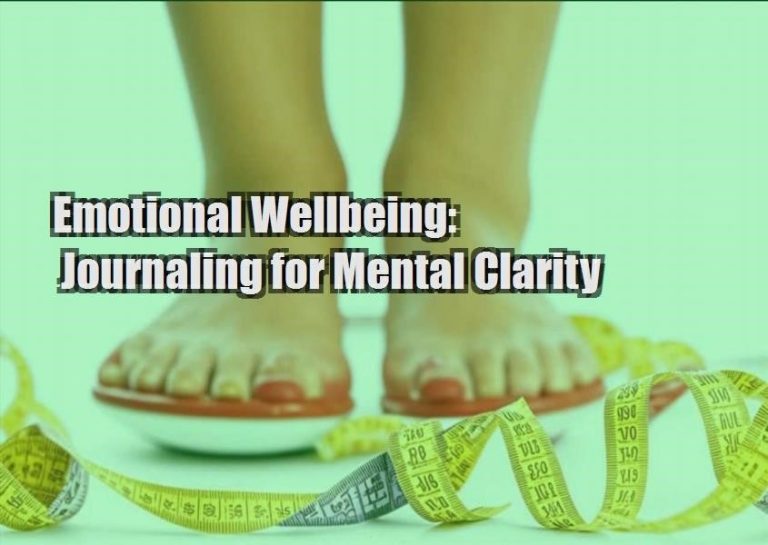Personal Wellbeing: Developing Healthy Habits for a Fulfilling Life
Personal wellbeing encompasses a holistic approach to maintaining a healthy and fulfilling life. It involves nurturing physical, mental, and emotional well-being through the adoption of healthy habits. Developing these habits requires a conscious effort and commitment to personal growth. Lets delve into the importance of personal wellbeing and explore practical strategies for establishing healthy habits.
Importance of Personal Wellbeing
- Enhances Physical Health: Healthy habits, such as regular exercise and a balanced diet, promote optimal bodily function, reduce the risk of chronic diseases, and increase longevity.
- Improves Mental Well-being: Practices like mindfulness, meditation, and spending time in nature have been shown to reduce stress, anxiety, and depression, while promoting emotional resilience and cognitive function.
- Increases Life Satisfaction: By prioritizing self-care and personal development, individuals experience greater contentment, purpose, and overall life satisfaction.
- Boosts Productivity: A healthy body and mind contribute to enhanced focus, concentration, and energy levels, leading to increased productivity in both personal and professional endeavors.
- Promotes Longevity: Embracing healthy habits can significantly extend lifespan and delay the onset of age-related health issues, resulting in a longer and more fulfilling life.
Developing Healthy Habits
Developing healthy habits is a gradual process that involves consistency and self-discipline. Here are some practical strategies:
1. Identify Your Habits
- Start by reflecting on your current habits, both positive and negative. Focus on areas where you believe improvement is possible.
- Keep a journal to track your behaviors, triggers, and motivations for various habits.
- Identify the why behind your desire to change, as this will provide motivation and accountability.
2. Set Realistic Goals
- Avoid overwhelming yourself with ambitious goals. Break down your desired habit changes into smaller, manageable steps.
- Set realistic timeframes for achieving your goals to avoid discouragement and ensure sustainability.
- Focus on one or two habits at a time to maximize your chances of success.
3. Create a Plan
- Determine the specific actions you need to take to adopt your desired habit.
- Identify potential obstacles and develop strategies to overcome them.
- Establish a routine or schedule that accommodates your new habit.
4. Reward Yourself
- Acknowledge and celebrate your progress, no matter how small.
- Reward yourself with something that motivates you, but is not detrimental to your overall well-being.
- Positive reinforcement can help maintain motivation and make habit formation more enjoyable.
5. Stay Patient and Persistent
- Developing healthy habits takes time and effort. Do not get discouraged by setbacks.
- Focus on the long-term benefits and approach the process with patience and persistence.
- Remember that progress is not linear and that setbacks are opportunities for learning and growth.
Specific Health Habits for Optimal Well-being
In addition to the general strategies outlined above, consider incorporating specific health habits into your daily routine:
1. Physical Activity
- Aim for at least 30 minutes of moderate-intensity physical activity most days of the week.
- Incorporate activities you enjoy, such as walking, cycling, or swimming.
- Find a workout buddy or join a fitness class for motivation and accountability.
2. Healthy Diet
- Focus on consuming nutrient-rich whole foods, including fruits, vegetables, whole grains, and lean proteins.
- Limit processed foods, sugary drinks, and unhealthy fats.
- Read food labels carefully and make informed choices about what you eat.
3. Sleep Hygiene
- Aim for 7-9 hours of quality sleep each night.
- Establish a regular sleep schedule and stick to it as much as possible.
- Create a relaxing bedtime routine that includes winding down and preparing your body for sleep.
4. Stress Management
- Identify sources of stress in your life and develop coping mechanisms.
- Practice relaxation techniques such as yoga, mindfulness, or deep breathing exercises.
- Seek professional help if stress becomes overwhelming or affects your daily functioning.
5. Social Connection
- Maintain strong relationships with family, friends, and loved ones.
- Make time for social activities that bring you joy and fulfillment.
- Volunteer or engage in community activities to connect with others and give back.
Conclusion
Personal wellbeing is a multifaceted journey that requires a holistic approach to health. By developing healthy habits in various aspects of life, you can enhance your physical, mental, and emotional well-being. Remember, consistency, patience, and self-discipline are key. Embark on this transformative journey and experience the profound benefits of a fulfilling and well-balanced life.







